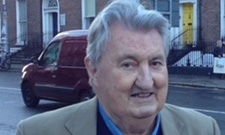
Harri Pritchard Jones, doctor, psychiatrist, author, raconteur, bon vivant and Welsh speaker who learned Irish, lit up a room whenever he entered, and every meeting and event he attended. His natural enthusiasm and desire to reach out was enthusiastically reciprocated, as I often witnessed, not least when he spent the month of August as the summer locum on the Aran Islands off the west coast of Ireland. He seemed more of a pastor to the islands’ scattered flock than their medical doctor. And it was there, under the shadow of the writer John Millington Synge, who had also been a summer visitor to the islands, that Harri, who has died aged 82, started to write his first book, Troeon (Turns), published in 1966.
Harri was born in Dudley, then in Worcestershire, now the West Midlands. His Welsh-speaking parents took him back to Wales and he grew up in Llangefni in Anglesey. After Llangefni grammar school he studied medicine at Trinity College, Dublin, where he became immersed in Irish culture. He returned to Wales and took up a post at a Cardiff hospital.
He converted to Catholicism and took up the cause of Welsh, developing a close relationship with Saunders Lewis, one of the founders of the Welsh nationalist party, Plaid Cymru, who was also a Catholic convert. As a member of Cymdeithas yr Iaith Gymraeg (the Welsh Language Society), Harri took part in many of the militant campaigns of the 1970s. He was jailed for 30 days for refusing to pay his TV licence as he campaigned for a Welsh language television channel (which was to become S4C). While in the cells of Cardiff jail he witnessed at first hand the bad treatment of prisoners. He called for more compassionate sentences.
Despite his conversion to Catholicism, he did not accept all the Vatican’s proscriptions, notably those regarding birth control and the role of women in the church. In fact, he remained what he always had been – an intellectual free spirit, and hibernophile and francophile, as his books make clear.
His first novel, Dychwelyd (Return, 1972), set in Dublin, won an Arts Council prize. He wrote 15 volumes of short stories and novels, all in Welsh. Two of his stories were translated into English and appeared in the Penguin Book of Welsh Short Stories. His last novel, Darnau’n disgyn i’w lle (To Piece Together, 2014) was dedicated to “the great people within the NHS who kept him alive and lucid this long”, says his son Guto.
Harri was an active member of the Welsh Academy, the national association of writers in Wales. He found it hard to refuse invitations to sit on committees, write articles for journals and newspapers, appear on radio and television, attend conferences, speak at seminars. He was a wonderful storyteller and most stimulating companion.
He is survived by his wife, Lenna, two sons, Guto and Illtyd, and a daughter, Nia.

